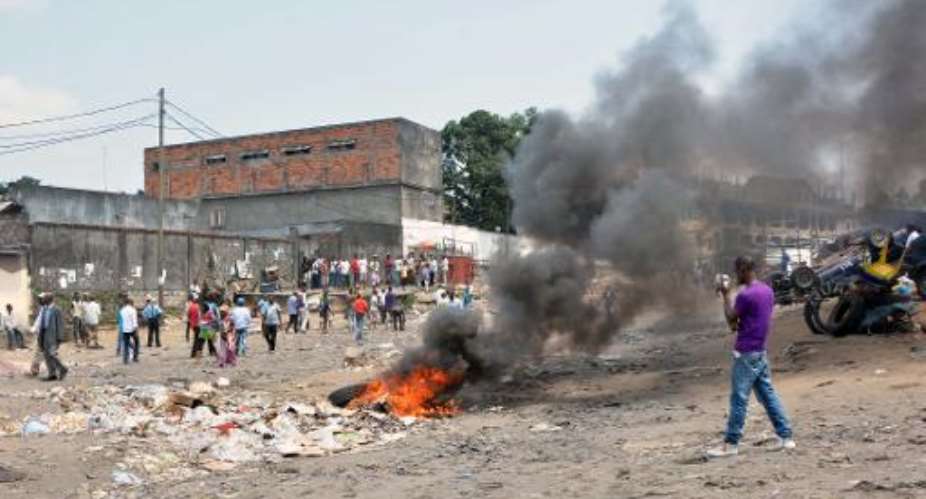Kinshasa (AFP) - Parliament in the Democratic Republic of Congo voted on Sunday in favour of a new election law after deadly protests erupted over opposition charges it would extend President Joseph Kabila's term in office.
The bill was approved in both houses after lawmakers agreed to remove a contentious provision making elections contingent on a new electoral roll to be drawn up after a census across the vast country set to begin this year.
However, the final text of the legislation left doubts over the timetable for fresh polls in the troubled central African nation which Kabila has led for 14 years.
Specifically, it does not contain a clause demanded by senators stating clearly that presidential elections must be organised according to the timetable laid down in the constitution -- that is in 2016.
The text also removes any reference to a 2015 date for local, provincial and senatorial polls, which must be held before a presidential vote.
Demonstrations against the bill descended into violence last week, with security forces firing live bullets and tear gas at protesters who hurled rocks and set fire to tyres and buildings. Shops were also looted.
Right groups reported that as many as 42 people were killed in the violence that raged for three days before the proposed amendment to the bill was announced on Saturday.
The authorities put the death toll at 12.
Opposition leaders complained that proposed census would take up to three years to finish, which would enable Kabila to stay in power beyond 2016 despite being constitutionally barred from running again.
"This is a victory... because there won't be (a delay) of the presidential election," Vital Kamerhe, head of the opposition Union for the Congolese Nation, had told AFP on Saturday.
- 'Jumping the gun' -
However, a source close to the government said opposition leaders were "jumping the gun in crying victory".
That view appeared to be shared by one diplomat following a meeting with Kabila Saturday, when European ambassadors and the head of the UN mission in the troubled country voiced their concern over the violence.
"We wonder what's actually behind this," said the diplomat, who added that he had previously been struck by Kabila's "clear determination" to drive the contested bill into law.
Kabila, now 43, first came to power in the mineral-rich country in January 2001 when Kinshasa politicians rushed to make the young soldier head of state after the assassination of his father rebel-turned-president Laurent Kabila.
In 2006, Kabila was returned to office in the DR Congo's first free election since independence from Belgium in 1960. He began his second and last five-year constitutional term after a hotly disputed vote in 2011.
Last' week's unrest is the latest upheaval to rock the former Zaire, which has been plagued by wars at a cost of millions of lives and weakened by decades of misrule.
Many African presidents have tried, and often succeeded, to stay in power by rewriting their countries' constitutions to get rid of limits on presidential terms.
However, Burkina Faso's president Blaise Compaore was chased from power last year when he tried to change the constitution to extend his 27-year rule.





 There’s nothing you can do for us; just give us electricity to save our collapsi...
There’s nothing you can do for us; just give us electricity to save our collapsi...
 Ghanaian media failing in watchdog duties — Sulemana Braimah
Ghanaian media failing in watchdog duties — Sulemana Braimah
 On any scale, Mahama can't match Bawumia — NPP Youth Organiser
On any scale, Mahama can't match Bawumia — NPP Youth Organiser
 Never tag me as an NPP pastor; I'm 'pained' the 'Akyem Mafia' are still in charg...
Never tag me as an NPP pastor; I'm 'pained' the 'Akyem Mafia' are still in charg...
 Your refusal to dedicate a project to Atta Mills means you never loved him — Kok...
Your refusal to dedicate a project to Atta Mills means you never loved him — Kok...
 2024 elections: I'm competent, not just a dreamer; vote for me — Alan
2024 elections: I'm competent, not just a dreamer; vote for me — Alan
 2024 elections: Forget NPP, NDC; I've the Holy Spirit backing me and nothing wil...
2024 elections: Forget NPP, NDC; I've the Holy Spirit backing me and nothing wil...
 2024 elections: We've no trust in judiciary; we'll ensure ballots are well secur...
2024 elections: We've no trust in judiciary; we'll ensure ballots are well secur...
 Performance tracker: Fire MCEs, DCEs who document Mahama's projects; they're not...
Performance tracker: Fire MCEs, DCEs who document Mahama's projects; they're not...
 Train crash: Railway ministry shares footage of incident
Train crash: Railway ministry shares footage of incident
